鲁教版(五四学制)八年级上册Unit 3 What were you doing when the rainstorm came?课件(共55张PPT)
文档属性
| 名称 | 鲁教版(五四学制)八年级上册Unit 3 What were you doing when the rainstorm came?课件(共55张PPT) |
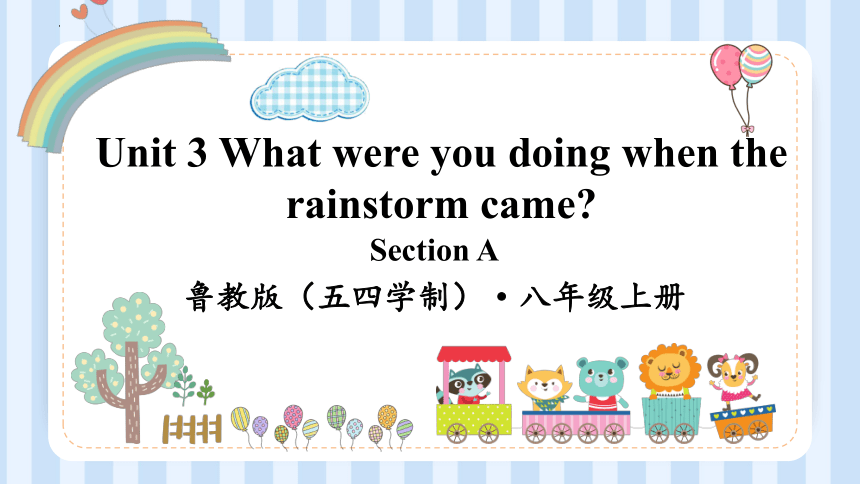
|
|
| 格式 | zip | ||
| 文件大小 | 5.5MB | ||
| 资源类型 | 教案 | ||
| 版本资源 | 鲁教版 | ||
| 科目 | 英语 | ||
| 更新时间 | 2022-10-07 00:00:00 | ||
图片预览

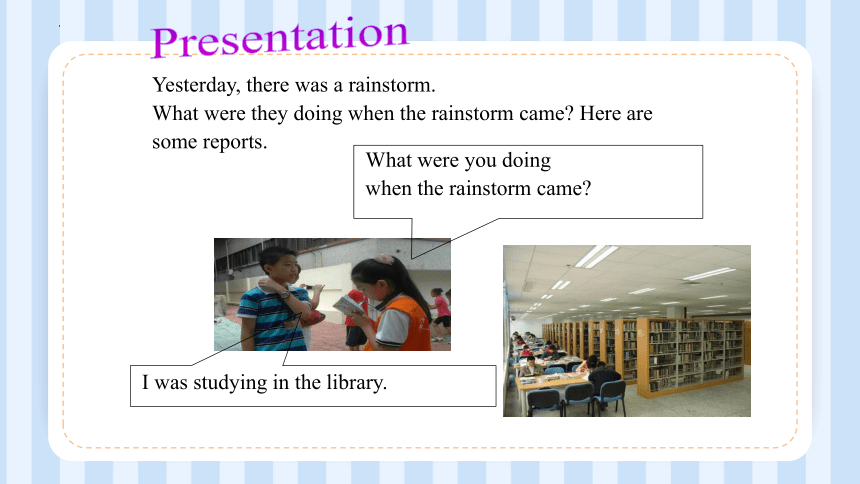
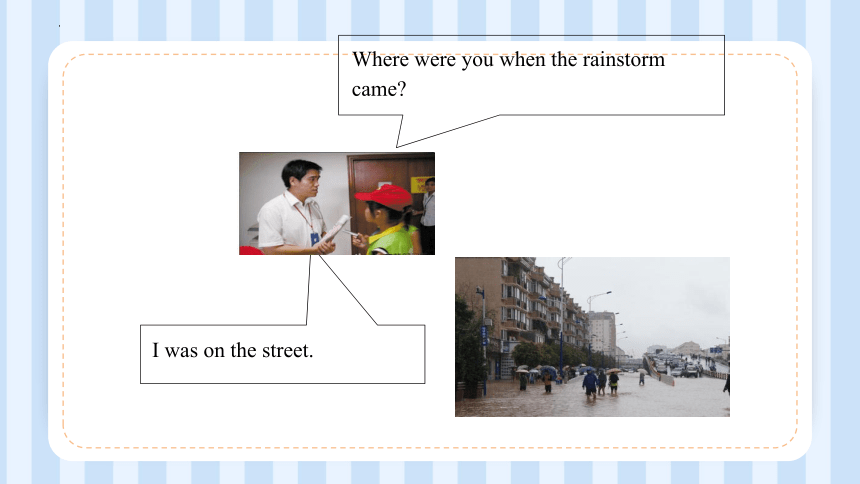
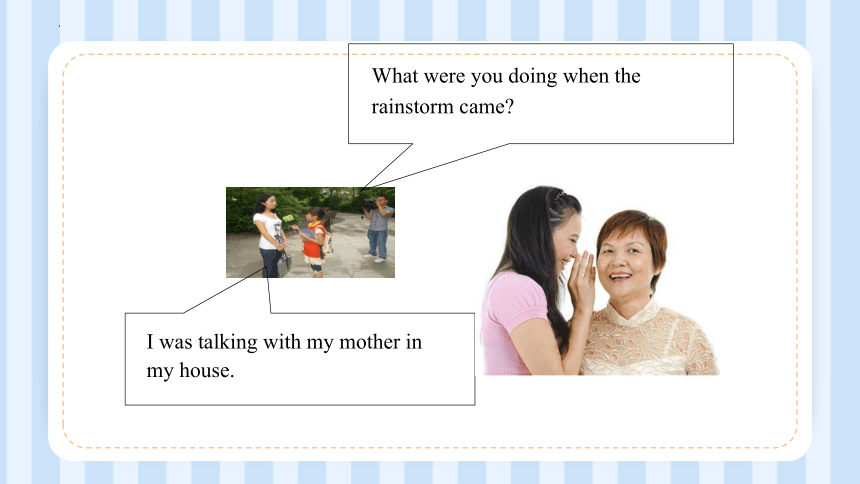
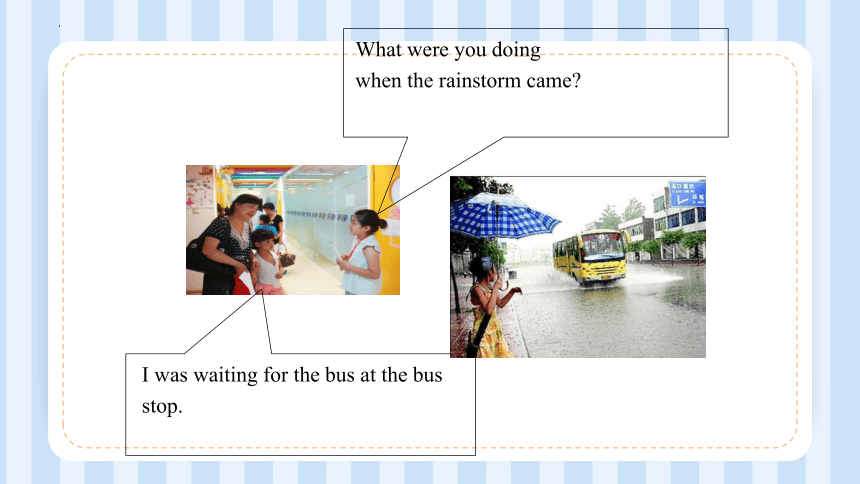
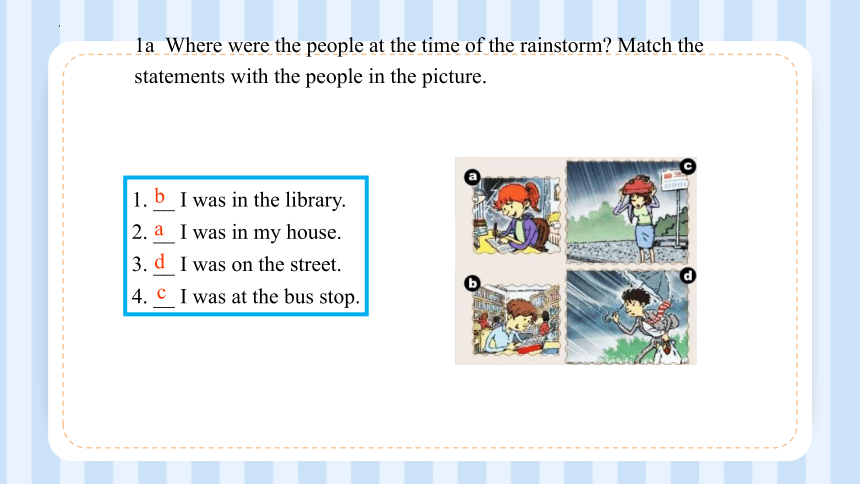
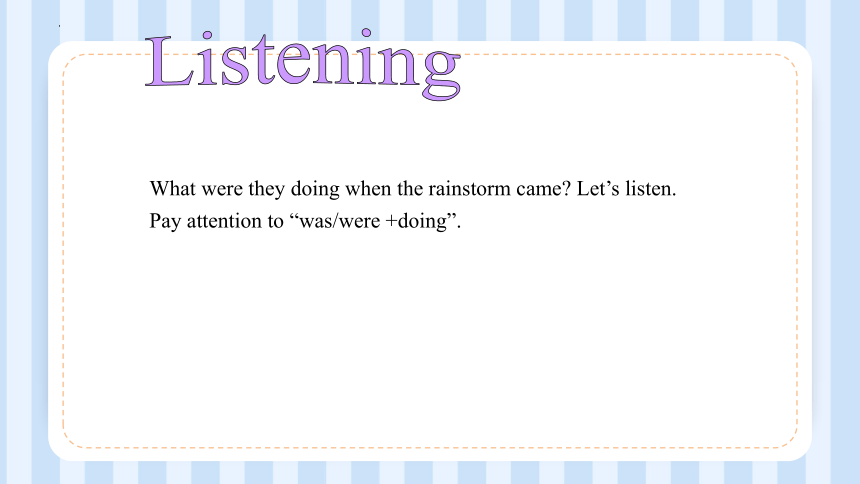
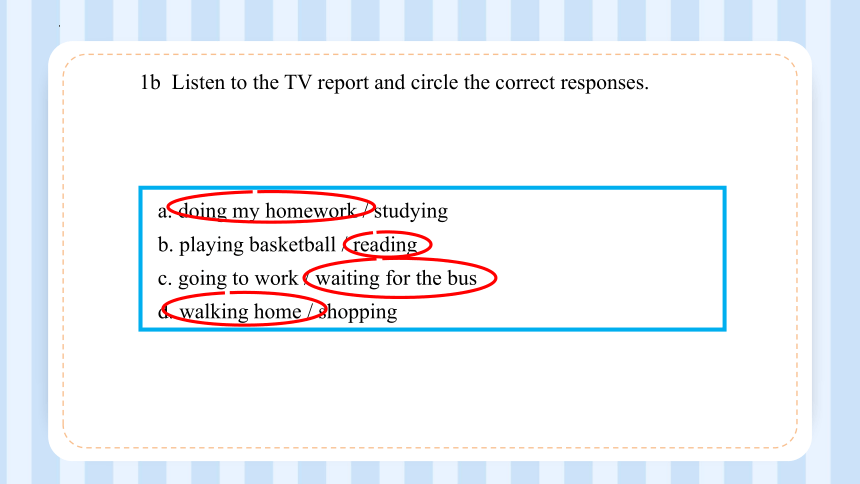
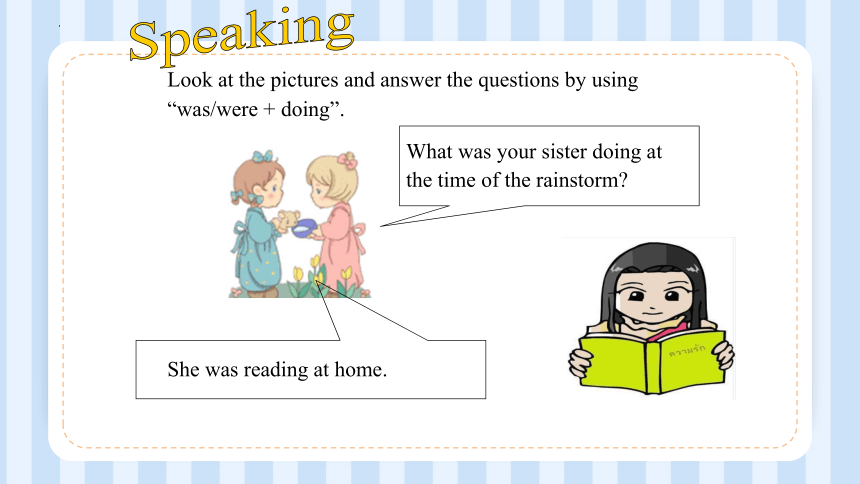
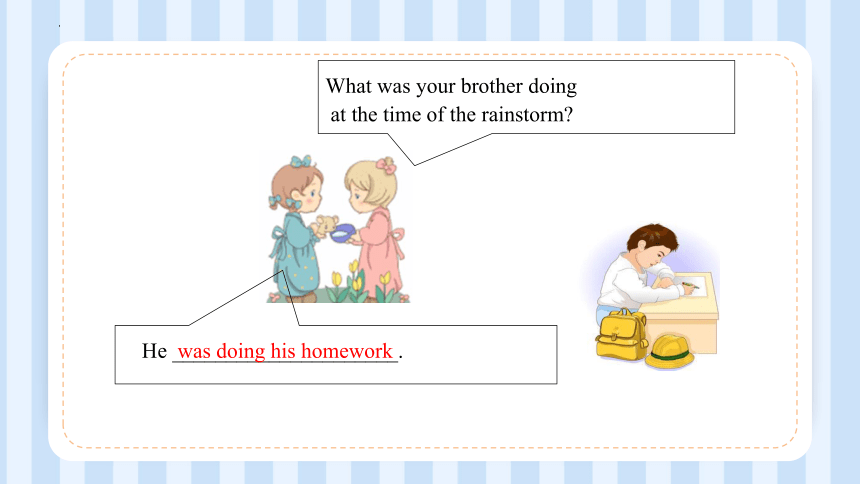
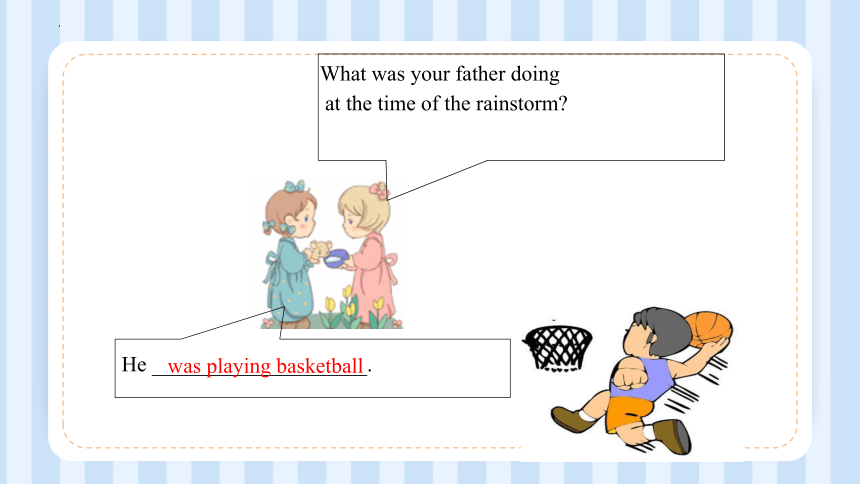
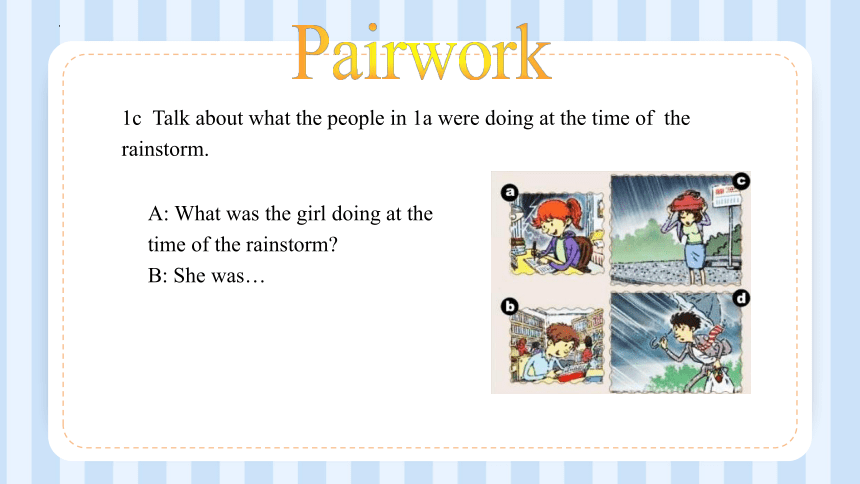
文档简介
(共55张PPT)
Section A
鲁教版(五四学制)·八年级上册
Unit 3 What were you doing when the rainstorm came
I was studying in the library.
Yesterday, there was a rainstorm.
What were they doing when the rainstorm came Here are some reports.
What were you doing
when the rainstorm came
Presentation
I was on the street.
Where were you when the rainstorm came
I was talking with my mother in my house.
What were you doing when the rainstorm came
I was waiting for the bus at the bus stop.
What were you doing
when the rainstorm came
1a Where were the people at the time of the rainstorm Match the statements with the people in the picture.
1. __ I was in the library.
2. __ I was in my house.
3. __ I was on the street.
4. __ I was at the bus stop.
b
d
c
a
What were they doing when the rainstorm came Let’s listen.
Pay attention to “was/were +doing”.
Listening
1b Listen to the TV report and circle the correct responses.
a. doing my homework / studying
b. playing basketball / reading
c. going to work / waiting for the bus
d. walking home / shopping
She was reading at home.
Look at the pictures and answer the questions by using “was/were + doing”.
What was your sister doing at the time of the rainstorm
Speaking
He _____________________.
What was your brother doing
at the time of the rainstorm
was doing his homework
He ____________________.
What was your father doing
at the time of the rainstorm
was playing basketball
1c Talk about what the people in 1a were doing at the time of the rainstorm.
A: What was the girl doing at the time of the rainstorm
B: She was…
Pairwork
Listening
2a Listen and number the pictures 1-5.
1
2
3
4
5
2b Listen again. Fill in the blanks in the sentences in 2a.
I ____ so busy _______
for the umbrella that I didn’t see a car coming.
My alarm didn’t go off so I _______ up late.
I took a hot shower
and _________ some
warm food.
was
looking
ate
woke
I ____________ for the bus when it began to rain heavily.
I _____ to the bus stop but I still missed the bus.
was waiting
ran
2c Use the information in 2a to retell the story in a conversation between the boy and a TV reporter.
TV reporter: Tell us what happened yesterday morning.
Boy: …
TV reporter: So, when the rainstorm suddenly came, what were you doing
Boy: …
Speaking
2d Role play the conversation.
Linda: Oh, I was in the kitchen helping my mom.
Mary: What were you doing last night, Linda I called at seven and you didn’t pick up.
Linda: What was I doing at eight Oh, I know. When you called, I was taking a shower.
Mary: I see. I called again at eight and you didn’t answer then either.
Mary: But then I called again at nine.
Linda: Oh, I was sleeping at that time.
Mary: So early That’s strange.
Linda: Yeah, I was tired. Why did you call so many times
Mary: I needed help with my homework. So while you were sleeping, I called Jenny and she helped me.
1. My alarm didn’t go off so I woke up late.
alarm n. 闹钟
e.g. What time shall I set the alarm for
我该把闹钟拨到几点钟响?
Language points
2. I was waiting for the bus when it began to rain heavily.
(1)begin v. (began) 开始
e.g. I’ll begin whenever you’re ready.
你什么时候准备好我就开始。
常用的句型:
begin to do与begin doing
一般来说,begin to do和begin doing可以互换,但在以下三种情况下,用to do。
主语不是指人,而是it等。
如:It began to rain.
begin后接表示心理活动的词。如:begin to know,还有believe, wonder, think等词。
begin本身是ing形式,为避免重复后接to do。 即:beginning to do
(2)heavily adv. 在很大程度上;大量地
e.g. moving heavily 吃力地移动
It was raining heavily. 雨下得很大。
3. So, when the rainstorm suddenly came, …
suddenly adv. 突然;忽然
e.g. I suddenly remembered that I hadn’t locked the door.
我忽然想起没有锁门。
4. That’s strange.
strange adj. 奇特的,奇怪的;不可思议的
e.g. a strange noise 奇怪的声音
He’s always here; it’s strange you’ve never met him.
他经常在这,你却没有见过他,真是不可思议。
5. I called at seven and you didn’t pick up.
pick up(=pick up the phone) 接电话
pick up 还有以下含义:
拾起;抱起
e.g.
The children picked up many sea shells at the seashore.
孩子们在海边捡到许多贝壳。
Pick that book up.
把那本书捡起来。
搭载
e.g.
The car stopped to pick me up.
汽车停下来接我。
We’ll send the ambulance to pick him up.
我们要派一辆救护车把他接走。
Make a survey. Ask your partners in your group what they were doing at the following time. Fill in the form and then give a report.
Speaking
Time Names doing
Yesterday 7:00 Tom reading
Peter shopping
Yesterday 8:00 Tom walking
Peter …
Yesterday 9:00 … …
Report: Tom was reading.
Peter was shopping…
A: What were you doing yesterday at 7:00
B: I was reading.
写出下列短语。
in the library
at the time of
go to work
wait for the bus
walk home
on the street
play basketball
play the piano
1. 在图书馆
2. 在……的时候
3. 去上班
4. 等公共汽车
5. 走路回家
6. 在街上
7. 打篮球
8. 弹钢琴
Summary
Section B
Presentation
1a. Think of a time when you were late for or couldn’t go to an event. What was the event What was the reason why you were late or couldn’t go Tell your partner the story.
1b. Listen and write short answers to the questions.
1. What event happened at the school yesterday
2. Who missed the event
3. Which team won at the event
Listening
What happened to the girl Let’s listen.
The school basketball competition.
Kate.
John’s team.
1c. Listen again. Number the events [1-6] in the order they happened.
____ Kate saw a dog by the side of the road.
____ Kate got to the bus stop.
____ Kate called the Animal Helpline.
____ Kate left the house.
____ Kate waited for someone to walk by.
____ Kate realized her bag was still at home.
1
2
3
4
5
6
1d. Talk about why Kate missed the school basketball competition. Student A begins a sentence with while or when.
Student B completes the sentence.
A: When the school basketball competition started …
B: When the school basketball competition started, Kate was still making her way to school.
Speaking
A: When she got to the bus stop, Kate …
B: When she got to the bus stop, Kate realized that her bag was still at home.
A: While she was running back home, …
B: While she was running back home, she saw a dog by the side of the road.
2a. Look at the pictures and the title in the passage. What do you think the passage is about
Do You Remember What You Were Doing
Presentation
The title can be helpful for you to understand
a text. It is also a good idea to read the first
sentence of each paragraph before you read
the whole text.
Read the title and first Sentences.
2b. Read the passage and answer the questions.
1. What are the two events in the passage
2. When did they happen
1. What are the two events in the passage
2. When did they happen
Dr. Martin Luther King was killed.
The World Trade Center in New York was taken down by terrorists.
Dr. Martin Luther King was killed on April 4, 1968.
The World Trade Center in New York was taken down by terrorists on September 11, 2001.
2c. Read the passage again. Are the following statements true (T) or false (F), or is the information not given (NG)
___ 1. Everyone in America remembers who killed Dr. King.
___ 2. Robert Allen was eating lunch when Dr. King was killed.
___ 3. Robert’s parents were shocked to hear the news.
___ 4. Kate Smith was watching a movie when a plane hit the World Trade Center.
___ 5. Kate didn’t think her friend was telling the truth about the event.
F
F
T
F
T
2d. Underline sentences from the passage with similar meanings to the ones below.
1. Not everyone will remember who killed him, but they can remember what they were doing when they heard that he got killed.
2. No one said anything for the rest of dinner.
Although some people may not remember who killed him, they remember what they were doing when they heard the news.
We finished the rest of our dinner in silence.
3. September 11, 2001---- the date alone means something to most people in the US.
4. I had trouble thinking clearly after that because I was very afraid.
Even the date --- September 11, 2001 --- has meaning to most Americans.
I was so scared that I could hardly think clearly after that.
1. passage n. 章节,段落
passage 作“(文章的)段落”解时,不限于文章的一个自然段,也可以由若干句话或若干个 paragraphs 组成。
passage 也可作“一段,一节”解,一般指讲话、文章或乐曲的一部分。
e.g. The teacher spent an hour in explaining this passage.
老师用了一小时来讲解这一段。
Choose the correct order of the following sentences to form a passage.
把下列句子排好顺序组成一篇短文。
2. My parents were completely shocked!
completely adv. 彻底地,完全地
e.g. I understand completely.
我完全明白。
shocked adj. 惊愕的;受震惊的
e.g. She was so shocked that she could hardly say a word.
她大为震惊,几乎一句话也说不出来。
[即学即练]
翻译下列句子。
看到邻居那样对待孩子我很惊愕。
他对她抽烟感到很震惊。
It shocked me to see my neighbors treated their children in that way.
He was shocked at her smoking.
3. My parents did not talk after that, and we finished the rest of our dinner in silence.
in silence 沉默,无声
without speaking or making a sound; silently
e.g. Many patients were waiting in silence.
许多病人在静静地等候着。
A hundred and fifty reporters sat in silence.
在场的150名记者静静地坐在那里。
4. I didn’t believe him at first.
at first “起初,首先”,作为介词短语,只起副词作用(在句中用作状语)。at first 主要用于强调前后对照,暗示接下去的动作与前面的动作不同甚至相反,因此常有 but, afterwards, soon, at last 等相呼应。如:
At first we used hand tools.
首先我们使用手工工具。
At first I didn’t want to go, but soon I changed my mind.
我开始不想去,但我很快就改变了主意。
A: When did Dr. Martin Luther King die
B: He died on …
2e. How much do you remember about the events in the passage Test your partner.
in history
in silence
at first
tell the truth
be shocked to do sth.
have trouble doing sth.
so … that
1. 在历史上
2. 默默地
3. 首先
4. 讲实话
5. 做......感到吃惊
6. 做某事有麻烦
7. 如此......以致
1. Remember the words and phrases in this lesson.
2. Finish the exercises in the workbook.
THANK YOU
Section A
鲁教版(五四学制)·八年级上册
Unit 3 What were you doing when the rainstorm came
I was studying in the library.
Yesterday, there was a rainstorm.
What were they doing when the rainstorm came Here are some reports.
What were you doing
when the rainstorm came
Presentation
I was on the street.
Where were you when the rainstorm came
I was talking with my mother in my house.
What were you doing when the rainstorm came
I was waiting for the bus at the bus stop.
What were you doing
when the rainstorm came
1a Where were the people at the time of the rainstorm Match the statements with the people in the picture.
1. __ I was in the library.
2. __ I was in my house.
3. __ I was on the street.
4. __ I was at the bus stop.
b
d
c
a
What were they doing when the rainstorm came Let’s listen.
Pay attention to “was/were +doing”.
Listening
1b Listen to the TV report and circle the correct responses.
a. doing my homework / studying
b. playing basketball / reading
c. going to work / waiting for the bus
d. walking home / shopping
She was reading at home.
Look at the pictures and answer the questions by using “was/were + doing”.
What was your sister doing at the time of the rainstorm
Speaking
He _____________________.
What was your brother doing
at the time of the rainstorm
was doing his homework
He ____________________.
What was your father doing
at the time of the rainstorm
was playing basketball
1c Talk about what the people in 1a were doing at the time of the rainstorm.
A: What was the girl doing at the time of the rainstorm
B: She was…
Pairwork
Listening
2a Listen and number the pictures 1-5.
1
2
3
4
5
2b Listen again. Fill in the blanks in the sentences in 2a.
I ____ so busy _______
for the umbrella that I didn’t see a car coming.
My alarm didn’t go off so I _______ up late.
I took a hot shower
and _________ some
warm food.
was
looking
ate
woke
I ____________ for the bus when it began to rain heavily.
I _____ to the bus stop but I still missed the bus.
was waiting
ran
2c Use the information in 2a to retell the story in a conversation between the boy and a TV reporter.
TV reporter: Tell us what happened yesterday morning.
Boy: …
TV reporter: So, when the rainstorm suddenly came, what were you doing
Boy: …
Speaking
2d Role play the conversation.
Linda: Oh, I was in the kitchen helping my mom.
Mary: What were you doing last night, Linda I called at seven and you didn’t pick up.
Linda: What was I doing at eight Oh, I know. When you called, I was taking a shower.
Mary: I see. I called again at eight and you didn’t answer then either.
Mary: But then I called again at nine.
Linda: Oh, I was sleeping at that time.
Mary: So early That’s strange.
Linda: Yeah, I was tired. Why did you call so many times
Mary: I needed help with my homework. So while you were sleeping, I called Jenny and she helped me.
1. My alarm didn’t go off so I woke up late.
alarm n. 闹钟
e.g. What time shall I set the alarm for
我该把闹钟拨到几点钟响?
Language points
2. I was waiting for the bus when it began to rain heavily.
(1)begin v. (began) 开始
e.g. I’ll begin whenever you’re ready.
你什么时候准备好我就开始。
常用的句型:
begin to do与begin doing
一般来说,begin to do和begin doing可以互换,但在以下三种情况下,用to do。
主语不是指人,而是it等。
如:It began to rain.
begin后接表示心理活动的词。如:begin to know,还有believe, wonder, think等词。
begin本身是ing形式,为避免重复后接to do。 即:beginning to do
(2)heavily adv. 在很大程度上;大量地
e.g. moving heavily 吃力地移动
It was raining heavily. 雨下得很大。
3. So, when the rainstorm suddenly came, …
suddenly adv. 突然;忽然
e.g. I suddenly remembered that I hadn’t locked the door.
我忽然想起没有锁门。
4. That’s strange.
strange adj. 奇特的,奇怪的;不可思议的
e.g. a strange noise 奇怪的声音
He’s always here; it’s strange you’ve never met him.
他经常在这,你却没有见过他,真是不可思议。
5. I called at seven and you didn’t pick up.
pick up(=pick up the phone) 接电话
pick up 还有以下含义:
拾起;抱起
e.g.
The children picked up many sea shells at the seashore.
孩子们在海边捡到许多贝壳。
Pick that book up.
把那本书捡起来。
搭载
e.g.
The car stopped to pick me up.
汽车停下来接我。
We’ll send the ambulance to pick him up.
我们要派一辆救护车把他接走。
Make a survey. Ask your partners in your group what they were doing at the following time. Fill in the form and then give a report.
Speaking
Time Names doing
Yesterday 7:00 Tom reading
Peter shopping
Yesterday 8:00 Tom walking
Peter …
Yesterday 9:00 … …
Report: Tom was reading.
Peter was shopping…
A: What were you doing yesterday at 7:00
B: I was reading.
写出下列短语。
in the library
at the time of
go to work
wait for the bus
walk home
on the street
play basketball
play the piano
1. 在图书馆
2. 在……的时候
3. 去上班
4. 等公共汽车
5. 走路回家
6. 在街上
7. 打篮球
8. 弹钢琴
Summary
Section B
Presentation
1a. Think of a time when you were late for or couldn’t go to an event. What was the event What was the reason why you were late or couldn’t go Tell your partner the story.
1b. Listen and write short answers to the questions.
1. What event happened at the school yesterday
2. Who missed the event
3. Which team won at the event
Listening
What happened to the girl Let’s listen.
The school basketball competition.
Kate.
John’s team.
1c. Listen again. Number the events [1-6] in the order they happened.
____ Kate saw a dog by the side of the road.
____ Kate got to the bus stop.
____ Kate called the Animal Helpline.
____ Kate left the house.
____ Kate waited for someone to walk by.
____ Kate realized her bag was still at home.
1
2
3
4
5
6
1d. Talk about why Kate missed the school basketball competition. Student A begins a sentence with while or when.
Student B completes the sentence.
A: When the school basketball competition started …
B: When the school basketball competition started, Kate was still making her way to school.
Speaking
A: When she got to the bus stop, Kate …
B: When she got to the bus stop, Kate realized that her bag was still at home.
A: While she was running back home, …
B: While she was running back home, she saw a dog by the side of the road.
2a. Look at the pictures and the title in the passage. What do you think the passage is about
Do You Remember What You Were Doing
Presentation
The title can be helpful for you to understand
a text. It is also a good idea to read the first
sentence of each paragraph before you read
the whole text.
Read the title and first Sentences.
2b. Read the passage and answer the questions.
1. What are the two events in the passage
2. When did they happen
1. What are the two events in the passage
2. When did they happen
Dr. Martin Luther King was killed.
The World Trade Center in New York was taken down by terrorists.
Dr. Martin Luther King was killed on April 4, 1968.
The World Trade Center in New York was taken down by terrorists on September 11, 2001.
2c. Read the passage again. Are the following statements true (T) or false (F), or is the information not given (NG)
___ 1. Everyone in America remembers who killed Dr. King.
___ 2. Robert Allen was eating lunch when Dr. King was killed.
___ 3. Robert’s parents were shocked to hear the news.
___ 4. Kate Smith was watching a movie when a plane hit the World Trade Center.
___ 5. Kate didn’t think her friend was telling the truth about the event.
F
F
T
F
T
2d. Underline sentences from the passage with similar meanings to the ones below.
1. Not everyone will remember who killed him, but they can remember what they were doing when they heard that he got killed.
2. No one said anything for the rest of dinner.
Although some people may not remember who killed him, they remember what they were doing when they heard the news.
We finished the rest of our dinner in silence.
3. September 11, 2001---- the date alone means something to most people in the US.
4. I had trouble thinking clearly after that because I was very afraid.
Even the date --- September 11, 2001 --- has meaning to most Americans.
I was so scared that I could hardly think clearly after that.
1. passage n. 章节,段落
passage 作“(文章的)段落”解时,不限于文章的一个自然段,也可以由若干句话或若干个 paragraphs 组成。
passage 也可作“一段,一节”解,一般指讲话、文章或乐曲的一部分。
e.g. The teacher spent an hour in explaining this passage.
老师用了一小时来讲解这一段。
Choose the correct order of the following sentences to form a passage.
把下列句子排好顺序组成一篇短文。
2. My parents were completely shocked!
completely adv. 彻底地,完全地
e.g. I understand completely.
我完全明白。
shocked adj. 惊愕的;受震惊的
e.g. She was so shocked that she could hardly say a word.
她大为震惊,几乎一句话也说不出来。
[即学即练]
翻译下列句子。
看到邻居那样对待孩子我很惊愕。
他对她抽烟感到很震惊。
It shocked me to see my neighbors treated their children in that way.
He was shocked at her smoking.
3. My parents did not talk after that, and we finished the rest of our dinner in silence.
in silence 沉默,无声
without speaking or making a sound; silently
e.g. Many patients were waiting in silence.
许多病人在静静地等候着。
A hundred and fifty reporters sat in silence.
在场的150名记者静静地坐在那里。
4. I didn’t believe him at first.
at first “起初,首先”,作为介词短语,只起副词作用(在句中用作状语)。at first 主要用于强调前后对照,暗示接下去的动作与前面的动作不同甚至相反,因此常有 but, afterwards, soon, at last 等相呼应。如:
At first we used hand tools.
首先我们使用手工工具。
At first I didn’t want to go, but soon I changed my mind.
我开始不想去,但我很快就改变了主意。
A: When did Dr. Martin Luther King die
B: He died on …
2e. How much do you remember about the events in the passage Test your partner.
in history
in silence
at first
tell the truth
be shocked to do sth.
have trouble doing sth.
so … that
1. 在历史上
2. 默默地
3. 首先
4. 讲实话
5. 做......感到吃惊
6. 做某事有麻烦
7. 如此......以致
1. Remember the words and phrases in this lesson.
2. Finish the exercises in the workbook.
THANK YOU
同课章节目录
- Unit 1 Could you please clean your room?
- Section A
- Section B
- Unit 2 Why don't you talk to your parents?
- Section A
- Section B
- Unit 3 What were you doing when the rainstorm came
- Section A
- Section B
- Unit 4 An old man tried to move the mountains.
- Section A
- Section B
- Unit 5 What's the highest mountain in the world?
- Section A
- Section B
- Unit 6 Have you read Treasure Island yet?
- Section A
- Section B
- Unit 7 Have you ever been to a museum?
- Section A
- Section B
- Unit 8 I've had this bike for three years.
- Section A
- Section B
